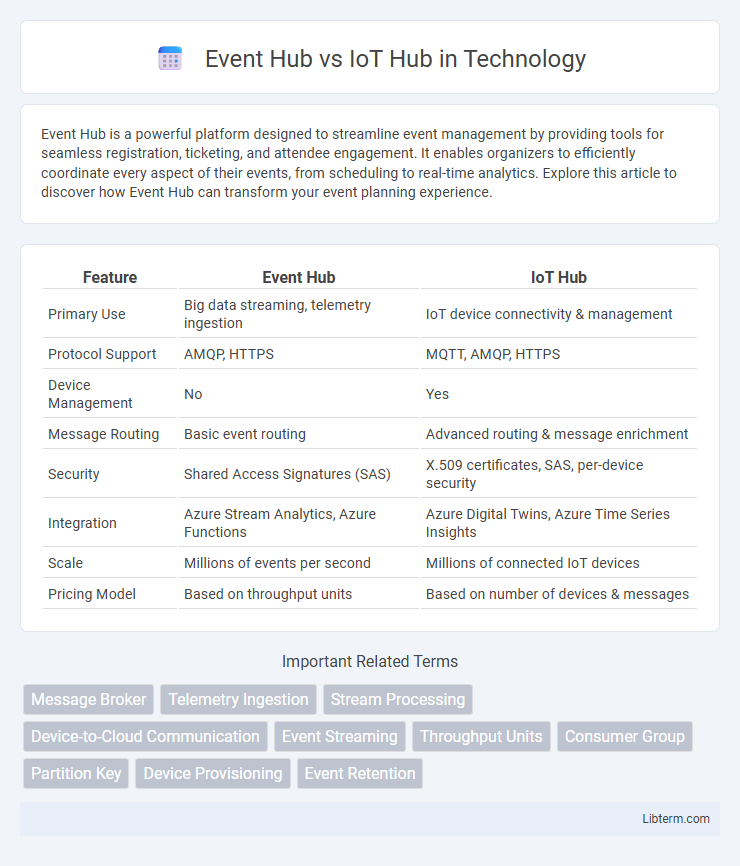Event Hub is a powerful platform designed to streamline event management by providing tools for seamless registration, ticketing, and attendee engagement. It enables organizers to efficiently coordinate every aspect of their events, from scheduling to real-time analytics. Explore this article to discover how Event Hub can transform your event planning experience.
Table of Comparison
| Feature | Event Hub | IoT Hub |
|---|---|---|
| Primary Use | Big data streaming, telemetry ingestion | IoT device connectivity & management |
| Protocol Support | AMQP, HTTPS | MQTT, AMQP, HTTPS |
| Device Management | No | Yes |
| Message Routing | Basic event routing | Advanced routing & message enrichment |
| Security | Shared Access Signatures (SAS) | X.509 certificates, SAS, per-device security |
| Integration | Azure Stream Analytics, Azure Functions | Azure Digital Twins, Azure Time Series Insights |
| Scale | Millions of events per second | Millions of connected IoT devices |
| Pricing Model | Based on throughput units | Based on number of devices & messages |
Introduction to Azure Event Hub and IoT Hub
Azure Event Hub is a fully managed, real-time data ingestion service designed to handle millions of events per second, making it ideal for big data and telemetry scenarios. IoT Hub specializes in secure, bi-directional communication between IoT devices and the cloud, supporting device management and telemetry data ingestion. Both services are crucial for scalable event processing, with Event Hub focusing on high-throughput event streaming and IoT Hub ensuring robust device connectivity and management.
Core Purpose and Use Cases
Event Hub is designed primarily for high-throughput data streaming and event ingestion from diverse sources, making it ideal for telemetry processing, real-time analytics, and log aggregation. IoT Hub focuses on secure device-to-cloud and cloud-to-device communication, enabling device management, bi-directional messaging, and telemetry for IoT solutions. Event Hub suits large-scale event streaming scenarios, while IoT Hub excels in managing connected IoT devices with features like device twins and direct method calls.
Architecture Overview
Event Hub features a highly scalable streaming platform designed to ingest massive amounts of real-time data across multiple sources using partitions and consumer groups for parallel processing. IoT Hub integrates device management and bi-directional communication, built on top of Event Hub's ingestion capabilities with added features such as device identity, secure connections, and device twin synchronization. The architecture of IoT Hub extends Event Hub by incorporating protocols like MQTT and AMQP, enabling enhanced device-to-cloud telemetry and cloud-to-device messaging in IoT solutions.
Message Ingestion and Throughput
Event Hub is designed for high-throughput data streaming, capable of ingesting millions of events per second with low latency, making it ideal for telemetry and large-scale event processing. IoT Hub, while supporting device-to-cloud messages, optimizes ingestion for secure, bi-directional communication with IoT devices, handling millions of messages per day with built-in device management and authentication. Event Hub provides broader event ingestion at scale, whereas IoT Hub focuses on secure, reliable device connectivity and message throughput tailored to IoT solutions.
Protocol Support
Event Hub supports AMQP, HTTPS, and Kafka protocols, enabling high-throughput event ingestion for big data and analytics scenarios. IoT Hub extends protocol support by including MQTT and HTTPS along with AMQP, specifically designed to facilitate reliable device-to-cloud and cloud-to-device communication in Internet of Things solutions. This makes IoT Hub more suitable for devices requiring diverse and bi-directional protocol compatibility, while Event Hub is optimized for large-scale event streaming.
Security and Authentication
Event Hub provides basic shared access signature (SAS) authentication, suitable for high-throughput data streaming but lacks device-level identity management and granular security controls. IoT Hub offers advanced security features including per-device authentication using X.509 certificates or symmetric keys, enabling secure bidirectional communication and fine-grained access control. IoT Hub's integration with Azure Security Center enhances threat detection and anomaly monitoring tailored for IoT deployments.
Integration with Azure Ecosystem
Event Hub offers seamless integration with Azure Stream Analytics, Azure Functions, and Power BI, enabling real-time data ingestion and analytics for large-scale event processing. IoT Hub provides specialized support for device-to-cloud and cloud-to-device communication, including device management, security features, and direct integration with Azure Digital Twins and Azure Time Series Insights. Both services integrate deeply with Azure Event Grid and Azure Logic Apps, facilitating automated workflows and scalable event-driven architectures within the Azure ecosystem.
Pricing and Cost Considerations
Event Hub pricing is based on throughput units, which determine the ingress and egress data rates, with additional costs for capturing data and long-term retention. IoT Hub pricing depends on the number of messages per day per unit, device-to-cloud and cloud-to-device messages, and usage tiers that affect features and message limits. Cost considerations for Event Hub center on large-scale data streaming scenarios, while IoT Hub pricing aligns with device connectivity, message frequency, and bidirectional communication needs.
Key Differences at a Glance
Event Hub is designed for high-throughput data streaming from a wide range of sources, supporting millions of events per second with minimal latency, primarily used for telemetry and logging data. IoT Hub provides bi-directional communication tailored specifically for Internet of Things (IoT) devices, offering device management, security features like per-device authentication, and protocol support including MQTT, AMQP, and HTTP. While Event Hub excels in event ingestion and analytics scenarios, IoT Hub focuses on secure, scalable device connectivity and comprehensive device lifecycle management.
Choosing the Right Solution
Event Hub excels in high-throughput event ingestion for real-time analytics, making it ideal for streaming large volumes of telemetry and log data from diverse sources. IoT Hub provides robust device management, bidirectional communication, and secure device-to-cloud integration, tailored for managing IoT deployments and device lifecycle at scale. Selecting the right solution depends on whether the priority is scalable event streaming (Event Hub) or comprehensive IoT device management and communication (IoT Hub).
Event Hub Infographic

 libterm.com
libterm.com